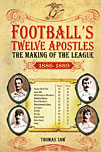 The Making of The League 1886-1889
The Making of The League 1886-1889
by Thomas Law
Desert Island Books, £16.99
Reviewed by Harry Pearson
From WSC 244 June 2007
For this reviewer the only disappointing thing about Football’s Twelve Apostles was that it slid through the letterbox during the hottest April for centuries. If ever there was a book that ought to be savoured in an armchair by a roaring fire (possibly with the accompaniment of port and pickled walnuts) it is this one.
Thomas Law’s entertaining history tells the story of the birth of the Football League. His main sources of information are contemporary newspaper accounts. As a consequence, the book is rich in the journalese of the late 19th century, a language at once racy and orotund, studded with an exuberant vernacular that sees Gainsborough Trinity attempting to lure Scottish players by “baiting their hook with the promise of a poodle” and West Bromwich Albion denounced for the “cowardly terrorism” of their tactics.
The book conjures up a lost sporting world – one that stands very much at odds with our ideas of sombre, upright Victorian Britain. In its pages we encounter “Jolly” Sir John Woods, patron of Preston North End, an inveterate gambler who refused to wager less than £100 a throw; football tacticians who encourage goalkeepers to “always try, when fisting out a ball, to strike an opposing forward on the nose, it is good fun”; and more strong drink and bad hangovers than all of George Best’s autobiographies put together.
It was in this heady atmosphere that the idea of a League grew. Before its advent , clubs played just FA Cup and “ordinary” matches – inter-club games of a type that would persist in rugby union for another century. Though the ordinary matches were not “friendlies” as such, a suspicion grew amongst fans and punters that teams were trying harder when they played in Cup matches and so crowds for the “ordinaries” shrank. The Cup itself was hardly satisfactory either. Aside from the fact that third round fixtures were so staggered that on occasions the last tie wasn’t played until six weeks after the first, there was the question of what winning it proved. Nobody believed it meant you were the strongest or best team, so exactly who was became a source of fascination and debate that no amount of triangular tournaments such as the one in which, typically, Preston beat Bolton, then lost to West Brom, who were in turn trounced by Bolton, could put an end to.
What was to be done about the situation was altogether harder to fathom. The idea of the sports league, so familiar to us now, was then more or less unheard of. And even though it had no idea what a league was the Football Association naturally opposed it. Yet somehow, accompanied by yelling, fights, pitch invasions and financial irregularities, the thing finally came together.
This is a great subject and Law handles his material with vim worthy of the players and officials whose deeds he is documenting. “In the early hours of the morning they awoke and called for drinks. The bars were not open!!! Just at that moment a barmaid was heard calling out: ‘Mr Suddell, your bath is ready’. Said a doughty member of the football crowd ‘Bring the bath here and we’ll drink it’. The bath was brought.” Marvellous.